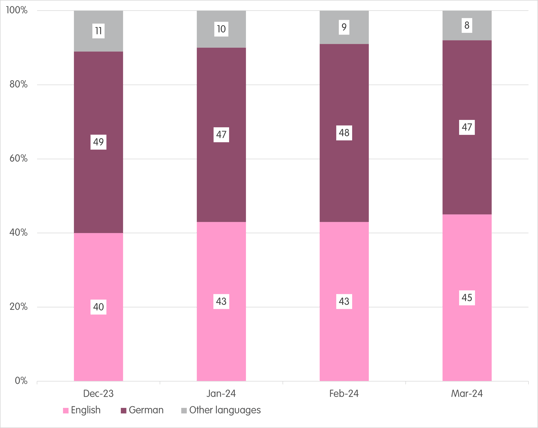2024 Week 16
This week we focus on the language of proceedings at the UPC, considering when the defendant can successfully request a change of the language of proceedings, and an overview of the current spread and trend of languages being used in UPC cases.
When can the defendant change the language of proceedings at the UPC?
We report on two UPC cases this week, both about defendants seeking to change the language of proceedings from German into the language of the patent (English, in both cases).
In MED-EL v. Advanced Bionics, infringement proceedings were launched in German at the Mannheim Local Division of the UPC. MED-EL is based in Austria, but the European patent is in English. Advanced Bionics requested that the language of the proceedings be changed from German to English. This was based in part on their argument that Advanced Bionics operates mainly in the English language and that there are corresponding Central Division revocation proceedings against the same patent ongoing in English. Note that there are three related defendants from the Advanced Bionics group, based in Switzerland, Germany and France respectively.
MED-EL pushed back hard against the attempt by Advanced Bionics to change the language of proceedings.
The Court’s view was that the point of allowing a change in the language is to allow flexibility and efficiency in the proceedings, and to ensure that the initial choice of the language of proceedings is not significantly detrimental to the defendant.
On the facts of the case, and in particular in view of the domiciles of the three related Advanced Bionics defendants, the court decided not to change the language of proceedings from German to English. Mere inconvenience to the defendants was not enough to have the language changed.
In view of the relative size of the opposing parties, the defendants could not argue that they would be left at a significant financial disadvantage by having German as the language of proceedings. Had there been such a financial imbalance, it seems that the court would have been likely to change the language.
The MED-EL v. Advanced Bionics first instance decision was issued on 15 April 2024. Two days later, on 17 April 2024, the Court of Appeal issued its decision on a different case for essentially the same question, in 10x Genomics v. Curio Bioscience, but with different facts and a different outcome.
The appeal was against a decision of the Düsseldorf Local Division of the UPC, rejecting an application from Curio to change the language of proceedings from German to English for a preliminary injunction application. Again, the language of the patent was English, but the preliminary injunction application had been brought in German.
The Court of Appeal decided to allow the appeal, changing the language of the proceedings from German to English. In their view, when deciding on a request to change the language of proceedings into the language of the patent on grounds of fairness, the relevant factors are:
- the language mostly used in the field of technology
- the language primarily used in the evidence and prior art
- the nationality or domicile of the parties – a party must be able to fully understand what is submitted by a representative on its behalf and what is submitted by the other party
- the size of the parties relative to each other
- whether a change of language will affect the course of the proceedings and lead to a delay
The Court of Appeal explained that the following factors are not relevant when deciding on the language of proceedings:
- the language proficiency of the representatives
- the nationality of the judges
- whether one of the parties falls under the specific definition of an SME under EU law – the relative size of the parties is more relevant
- the prevalence of particular languages in the EU at large
- where the alleged infringement has occurred, other than the extent to which this leads to the jurisdiction of a UPC Local Division
The Court of Appeal commented that where there is an equal balance of interests between the parties, the position of the defendant is the decisive factor. This is because the claimant has the tactical advantage of choosing when and where to bring infringement proceedings and in which language. Also, the Court of Appeal commented that a switch to the language of the patent should be a known risk for the claimant, particularly since any proceedings at the Central Division would in any event be in the language of the patent.
An interesting additional comment from the Court of Appeal points towards future cases on substantive issues:
“Also in infringement actions, the language in which the patent was granted is often of importance, such as with claim construction.”
When determining the scope of protection of a patent, this appears to be an acknowledgement that the arguments about precise interpretation of the claims would best be made in the same language as the language of the patent.
This was a wide-ranging decision from the UPC Court of the Appeal, discussing many factors that should be taken into account when deciding on a change in the language of proceedings. It provides clarity on this question which will be of significant practical interest to potential users of the UPC. When a party is sued at the UPC by a bigger company for infringement of an English language European patent, but the proceedings are not initially in English, the approach of the courts is likely to be to allow a switch of language to English.
What is the spread of languages used in UPC proceedings?
The UPC has been providing information since the end of 2023 about its case load, including the language of proceedings. As the graph below shows, as at the end of March 2024, the number of cases in German (47%) and English (45%) is nearly the same, with English having been gradually catching up. It is possible that German language cases had a head start because of the success of the German UPC Local Divisions in attracting initial UPC infringement cases, and the late decision by those courts to designate English (in addition to German) as an acceptable language of proceedings. Possibly many claimants had already prepared their UPC infringement action in German before it was clear that English was also available.
As discussed above, clarity has now been provided by the UPC Court of Appeal on when a switch to the language of the patent will be allowed in UPC proceedings. About three quarters of European patents are granted in English. It therefore seems likely that English will first catch up with, and then overtake, German as the main language of UPC proceedings.

Matthew is a UPC Representative and European Patent Attorney. He is a Partner and Litigator at Mewburn Ellis. He handles patent and design work in the fields of materials and engineering. His work encompasses drafting, prosecution, opposition, dispute resolution and litigation – all stages of the patent life cycle. Matthew has a degree and PhD in materials science from the University of Oxford. His focus is on helping clients to navigate the opportunities and challenges of the Unified Patent Court.
Email: matthew.naylor@mewburn.com



-1.png)